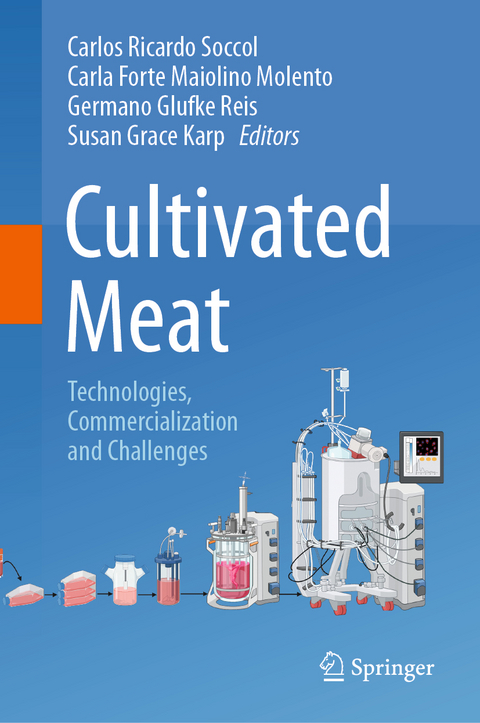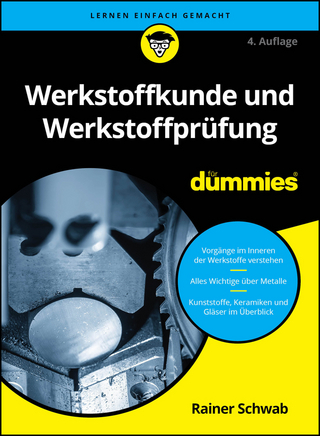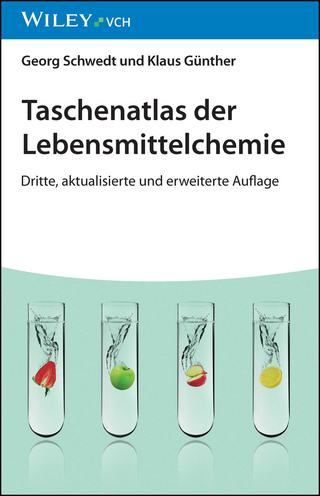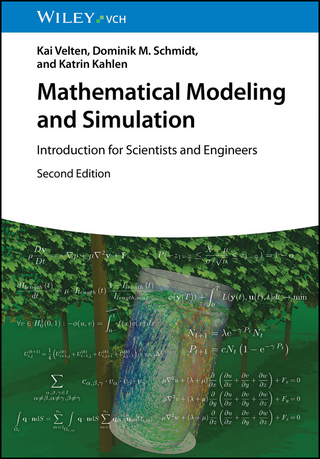
Cultivated Meat
Springer International Publishing (Verlag)
978-3-031-55967-9 (ISBN)
Cultivated meat is an emerging substitute for conventional meat that is not associated with animal farming and slaughtering. Instead, animal cells are cultivated in bioreactors and post-processed into "artificial" meat products. Although this new technology solves several ethical and environmental problems, there are techno-economic challenges that need to be addressed to make the commercial-scale production of cultivated meat a real perspective. This book addresses fundamental aspects of new food systems, animal cell culture and cultivated meat production, including cell lines, culture media, microcarriers and scaffolds, bioreactors, downstream processes, formulation, packaging, quality control, scale-up, and waste management. Also, aspects related to commercialization, market, patents, legislation, global and regional policies, and sustainability metrics such as life-cycle assessment, together with a bioeconomy perspective analysis, are reviewed. Finally, case studies are presented and the challenges and future prospects for cultivated meat production are proposed. This book is a collection of 21 chapters written by specialists in the field.
Carlos Ricardo Soccol, Chemical Engineering degree from the Federal University of Paraná (1979), Ph.D. in Genie Enzymatique, Microbiologie et Bioconversion - Universite de Technologie de Compiègne-França (1992). Accomplishments include mentorship of undergraduate and postgraduate programs in Bioprocess Engineering and Biotechnology, coordinator of various biotech initiatives, and numerous awards. Holds positions as a Full Professor at the Federal University of Paraná, Visiting Professor at international institutions, and editorial roles. Specializes in Industrial Biotechnology, with expertise in bioprocess engineering, applied biotech, scale-up, bioseparation, tissue culture, and technology transfer. Significant publication record, including books, chapters, articles, and patents.
Carla Forte Maiolino Molento, Veterinary Medicine degree (1990), Master's in Veterinary Sciences (1995), Ph.D. in Zootechnics (2001), and Post-Doctorate in Animal Welfare (2011). Currently an associate professor, Coordinator of the Graduate Program in Veterinary Sciences, and heads Animal Welfare and Cellular Animal Science labs. Teaches Ethology and Animal Welfare, supervises research in Animal Welfare and Cellular Zootechnics. Specializes in improving animal welfare in production, companionship, and labs. Research focuses on alternative methods for food production. Coordinates research and innovation in Alternative Proteins funded by Araucária Foundation.
Germano Glufke Reis, Professor at the Federal University of Paraná, School of Business Administration. He teaches in various business administration programs and coordinates the SfoodLab. Researcher in innovation capabilities and alternative proteins projects. Visiting scholar at the University of Helsinki. Holds degrees from FEA/USP, University of Cambridge, Erasmus University of Rotterdam, FGV/EAESP, and the University of Brasília. Editorial board member and associate editor for academic journals. Research interests include sustainable global value chains, cultured meat, alternative proteins, and international strategy management.
Susan Grace Karp, Bioprocess Engineering and Biotechnology graduate (2005). Holds Masters degrees in Microbial Biotechnology for Sustainable Development (2007) and Biotechnological Processes (2007). Ph.D. in Bioprocess Engineering and Biotechnology (2012) with an internship at Università degli Studi di Napoli Federico II. Worked as an engineer, analyst, and professor in biotechnology for several years. Currently an assistant professor, coordinator, and researcher at the Federal University of Paraná. Expertise in biotechnological processes, patents, innovation, and bioeconomy. Specializes in bio-ethanol, lactic acid, solid-state fermentation, and bioactive compounds by macrofungi.
Introduction to new food systems.- Introduction to animal cell culture.- Cell lines for cultivated meat production.- Culture medium for cultivated meat.- Microcarriers and scaffolds in cultivated meat production.- Bioreactors for cultivated meat production.- Modeling and Simulation of Cell Cultures in Cultivated Meat Production.-Downstream processes for cultivated meat.- Ingredients and formulation of cultivated meat products.-Packaging, conservation and shelf life of cultivated meat.- Quality and Risk Control in Cultivated Meat Production.- Scaling up of cultivated meat production process.- Waste management in cultivated meat production.- Environmental Impacts of Cultivated Meat.- Regulatory Aspects of Cultivated Meat.- Forecasting the market potential and consumer acceptance of cultivated meat.- Cultivated meat and bioeconomy in tandem: unlocking the sustainability implications of transformative food supply chains.- Global and regional policies for cultivated meat.- Patents and innovations in cultivated meat production.- Future Feast: Mapping the Cultivated Meat Sector.- Challenges and prospects for cultivated meat production.
| Erscheinungsdatum | 06.06.2024 |
|---|---|
| Zusatzinfo | VII, 441 p. 87 illus., 51 illus. in color. |
| Verlagsort | Cham |
| Sprache | englisch |
| Maße | 155 x 235 mm |
| Themenwelt | Naturwissenschaften ► Chemie |
| Technik ► Lebensmitteltechnologie | |
| Technik ► Maschinenbau | |
| Technik ► Umwelttechnik / Biotechnologie | |
| Schlagworte | Animal-cell meat • artificial meat • Cell-based meat • Cellular meat • Cultivated meat • Cultured Meat • Lab-grown Meat • Synthetic meat |
| ISBN-10 | 3-031-55967-3 / 3031559673 |
| ISBN-13 | 978-3-031-55967-9 / 9783031559679 |
| Zustand | Neuware |
| Informationen gemäß Produktsicherheitsverordnung (GPSR) | |
| Haben Sie eine Frage zum Produkt? |
aus dem Bereich


